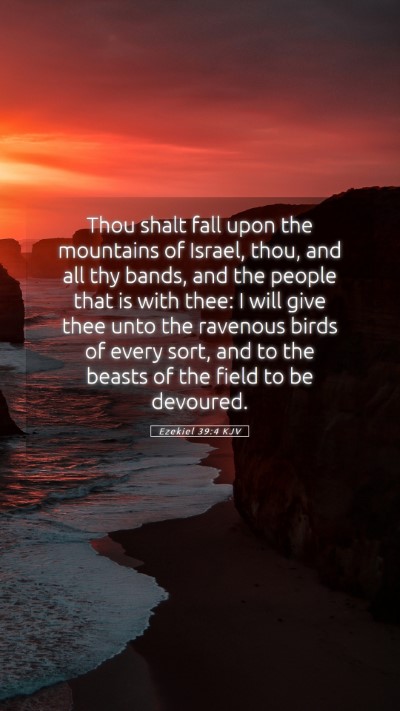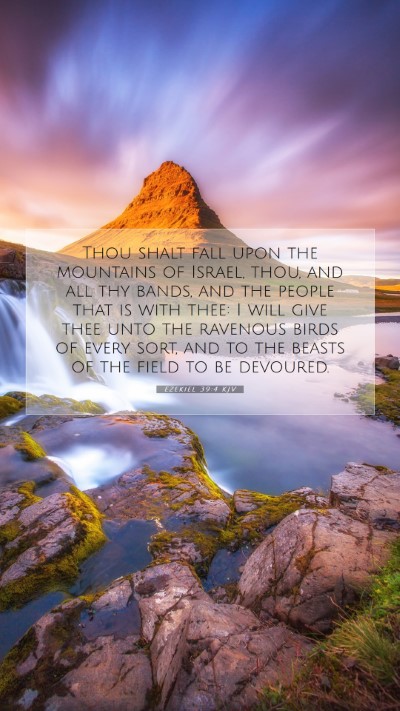Ezekiel 39:4 Bible Verse Explanation
Bible Verse: Ezekiel 39:4 - "You shall fall upon the mountains of Israel, you and all your troops and the peoples who are with you; I will give you to birds of prey of every sort and to the beasts of the field to be devoured."
Overview of Ezekiel 39:4
This verse is part of a prophetic declaration by the prophet Ezekiel, addressing the downfall of Israel's enemies, particularly Gog and his coalition. The imagery employed here highlights the total destruction awaiting the adversaries who come against God's people.
Combined Insights from Public Domain Commentaries
Matthew Henry's Commentary
Henry emphasizes God's sovereignty over the nations and His ability to bring judgment upon those who oppose His chosen people. He points out that the imagery of falling on the mountains of Israel signifies a complete defeat. The mention of birds and beasts devouring the fallen is a vivid picture of humiliation and utter destruction, indicating that the enemies of God will not only face death but disgrace as well.
Albert Barnes' Notes on the Bible
Barnes highlights the universality of the judgment coming upon Gog's forces. He explains that the mountains symbolize prominence and strength, and yet here they serve as the grave for the enemies of Israel. The beasts and birds represent scavengers, which signifies that these enemies will be treated as refuse, showing God's disdain for them. The verse assures readers that God will protect His people from all harm.
Adam Clarke's Commentary
Clarke offers a thorough interpretation of the prophetic implications of this passage, suggesting that such vivid descriptions serve a dual purpose: to warn foes of the fate that awaits them and to comfort the oppressed people of God. Clarke notes that the explicit mention of the mountains indicates a geographical assurance that God's protection is comprehensive and that no one can withstand His will.
Thematic Analysis
- Judgment: Ezekiel speaks of divine judgment as a central theme, illustrating God's control over the fate of nations.
- Protection: The verse reassures believers that God will safeguard His people, promising that their enemies will be dealt with decisively.
- Humiliation of Enemies: The destruction portrayed here serves not only as a physical defeat but also a spiritual and moral indictment against those who oppose God.
Application of Ezekiel 39:4
For modern readers, the application of this verse may be found in recognizing God's ultimate authority and the assurance that He fights for His people. Just as Israel was given victory, so too can believers find hope in the protection God offers against their adversaries in today's world.
Cross References
- Revelation 19:17-21: Describes the final judgment of God's enemies, echoing similar themes of defeat and divine judgment.
- Isaiah 34:1-4: Explores God's wrath against nations and their inevitable downfall.
- Psalm 68:21: Affirms that God will bring judgment upon His adversaries, reinforcing the themes found in Ezekiel.
Conclusion
In summary, Ezekiel 39:4 serves as a powerful verse illustrating God's sovereignty, the definite judgment on adversaries, and the resulting protection for His people. The insights from the commentaries of Matthew Henry, Albert Barnes, and Adam Clarke provide a multifaceted understanding of this scripture. For those engaged in Bible study or seeking Bible verse meanings, this passage exemplifies the profound themes of divine justice and protection that resonate throughout Scripture.
Further Study Suggestions
For individuals or groups seeking to dive deeper, consider exploring:
- Bible study guides focused on prophetic literature.
- Online Bible study tools that offer historical and cultural context.
- Bible study plans that incorporate other passages discussing God’s sovereignty and judgment.


